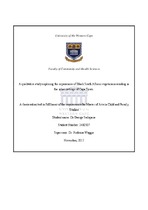| dc.contributor.advisor | Waggie, Firdouza | |
| dc.contributor.author | Sedupane, George | |
| dc.date.accessioned | 2018-03-24T09:39:48Z | |
| dc.date.available | 2018-03-24T09:39:48Z | |
| dc.date.issued | 2017 | |
| dc.identifier.uri | http://hdl.handle.net/11394/5844 | |
| dc.description | Magister Artium - MA (Child and Family Studies) | |
| dc.description.abstract | Vegetarianism is a growing global trend. Movie stars and world class athletes proudly brand
themselves vegetarian. Apart from its health implications vegetarianism has been extensively
studied as a social and psychological phenomenon. However the understanding that has
emerged from these studies has almost exclusively reflected Caucasian Western societies.
Internationally there is a paucity of research regarding vegetarianism among people of African
descent. The purpose of this study was to fill this knowledge gap by exploring the development
of a vegetarian identity among Black urban South Africans living in Cape Town and the
contextual factors involved in their adoption and practice of vegetarianism. Bronfenbrenner’s
bioecological systems theory which emphasizes the bidirectional influence between human
behaviour and broader contextual factors was used as a theoretical framework for
understanding vegetarianism among Black South Africans. This study used a qualitative
exploratory approach to describe the perceptions and experiences of Black vegetarians.
Snowball sampling was used to locate eight Black South African adult vegetarians who were
interviewed in depth. The audio recorded interviews were transcribed and analysed through
thematic analysis yielding three main themes. The first and central theme is that
“vegetarianism is life.” This theme encapsulates the fact participants view vegetarianism as an
instrument through which the highest ideals of life are attained including physical vitality,
spiritual vibrancy and intellectual superiority. In the second theme the process of developing
a vegetarian identity was unfolded. Contextual religio-cultural influences of Rastafarianism
and Seventh day Adventism were a major influence in the development of a vegetarian identity.
The last theme unfolds the experience of Black vegetarians living in meat dominated society.
The study reveals that becoming a vegetarian definitely affects one’s social relations. However
the gender of the vegetarians modulated the reaction of family members. Vegetarians also
employed several strategies to manoeuvre difficult social situations. This study is among the
first to contribute an African perspective to the global vegetarian discourse. It has highlighted
the way Black Africans develop a vegetarian identity and the contextual factors acting as
barriers and facilitators to this development. It has highlighted how this identity is informed
by their Africanness though at times it conflicts with certain African ideals. Finally it has
identified the social, cultural and psychological variables involved in the vegetarian
phenomenon on the African continent. | |
| dc.language.iso | en | |
| dc.publisher | University of the Western Cape | |
| dc.title | A qualitative study exploring the experiences of Black South African vegetarians residing in the urban settings of Cape Town. | |
| dc.rights.holder | University of the Western Cape | |

